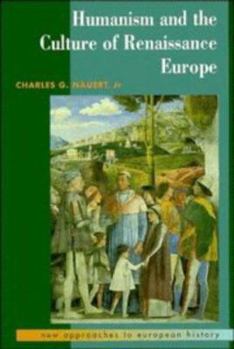Humanism and the Culture of Renaissance Europe
(Book #6 in the New Approaches to European History Series)
Select Format
Select Condition 
Book Overview
This new textbook provides a synthesis of the major themes of the European Renaissance, one of the most influential cultural revolutions in history. Professor Nauert traces the origins of the humanist "movement" and its development in the social and political environments of the wider European context. He charts the key intellectual, social, educational and philosophical concerns of this humanist revolution, using art and biographical sketches of...
Format:Paperback
Language:English
ISBN:0521407249
ISBN13:9780521407243
Release Date:September 1995
Publisher:Cambridge University Press
Length:247 Pages
Weight:0.84 lbs.
Dimensions:0.6" x 6.0" x 9.0"
Customer Reviews
2 ratings
Studia Humanitatis
Published by Thriftbooks.com User , 15 years ago
The first sentence of the Introduction sets the tone: "The last thing readers want from the authors of history books is arcane historiographical debates among contending schools of interpretation." Charles Nauert delivers what readers want: an enjoyable yet scholarly explanation of the birth, growth and death of Humanism in Renaissance Europe. The first sentence was at first irritating for me, because much of the first quarter of the book is devoted to demolishing myths about humanism, and in the rest of the book, the accuracy of contemporary views is often questioned. But irritation is fitting, because Humanism itself was irritating for the medieval status quo. There is no doubt that the author is an example of the questioning critic that was typical of the great Humanists. (It is also irritating that Nauert accepts an outdated view in a closing remark, namely that England "led the way" to the new European culture where science replaced old ways of thought. This was a pan-European phenomenon led by no individual country, as has been shown by Jonathan Israel's research on the Enlightenment.) Granted the many misconceptions, what exactly was Renaissance Humanism? It was a culture with a specific historical perspective. It strongly favoured an educational curriculum based on studia humanitatis, which Cicero defined as a broad range of subjects that one must study to develop one's full potential as a human being, to develop social values and to develop the necessary oratorical skills of the elite. The curriculum included grammar, poetry, rhetoric, history, politics, and moral philosophy. Humanism meant replacing Medieval Latin and Greek with their literary forms from Antiquity. Humanism rejected the Scholastic's gullible, unquestioning acceptance of ancient (and often faked) texts. Scholastics tended to construct sterile rationale arguments using quotations from ancient writings without regard for context. Humanists invented historical criticism and proved important documents to be fakes, such as the Donation of Constantine, forged four centuries after Constantine. (Nauert mentions that even after the forgery was clearly proved the Roman Church continued to refer to it as if it was authentic. How little things change.) Compared to the high civilization of Rome and Greece, Petrarch defined the centuries since the decline of Rome as dark and barbaric. Humanists wished to learn from and revive the greatness of the Classic and early Christian ages in the form of a cultural renaissance. They wanted to reform and "create a better future by capturing the essential qualities of Antiquity." Along with contextual interpretation, Humanism recognised cultural relativism. Humanism started despite the Universities and had a long battle to establish influence within Universities and to change curricula. This fight sparked the Humanist innovation of using the printing press as a weapon. "Petrarch, Valla, Machiavelli and Erasmus pioneered in defining the role
Outstanding
Published by Thriftbooks.com User , 20 years ago
Nauert does an exceptional job of making accessible a vaporous topic. In the process he dispells many "myths" that would otherwise cloud the subject. He establishes humansim as an "intellectual approach" and not a philosophical method. From this stance, he can demonstrate the mulitple and contrasting manifestations of humanism. His section on Petrach is exceptional. Beyond the sonnet, Petrach developed the notion of historical change. This would prove critical in the humanistic approaches to interpretation of texts. All this may sound dry, but if your interests include intellectual history, this is one of the most accessible surveys I've seen. My one criticism is the lack of emphasis on the sharp contrast humanist education and the drudgery of scholasticism. More here could have emphasized the appeal of humanism to younger generations.






